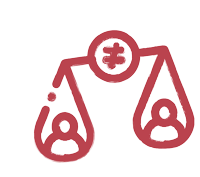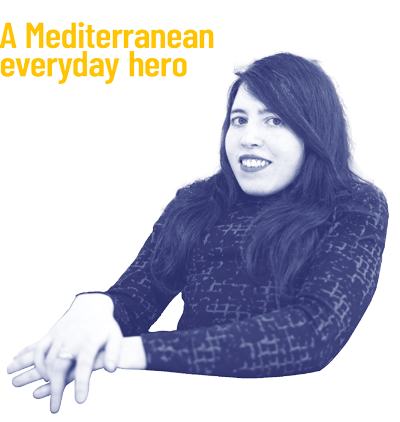
Inequalities
Socioeconomic gaps plague the Mediterranean, while gendered stereotypes and intergenerational misunderstandings contribute to deepening divides within and across countries and regions, stifling progress. We must confront these inequalities head-on to build a fairer and more prosperous future for all.
Khadija Jallouli
In the heart of Tunisia, a remarkable startup is breaking barriers and revolutionizing the concept of accessible transportation. Meet Khadija Jallouli, the cofounder and CEO of Hawkar, a Tunisian startup that is making waves with its innovative electric vehicle designed for individuals with disabilities.
Khadija’s personal journey led her to recognize the pressing need for a solution to the mobility challenges faced by people with disabilities in Tunisia. As someone who uses a wheelchair herself, she experienced firsthand the difficulties of everyday commuting due to the lack of suitable infrastructure and public transportation. Determined to make a difference, Khadija embarked on a mission to develop a vehicle that would empower individuals with disabilities and promote inclusivity.

“One of the main challenges I encountered was the ability to make the right choice. When you don’t have enough experience on a topic, you must call on people who do. You can’t rush into decisions; you have to take your time and ask for advice. That was my biggest lesson.” – Khadija Jallouli, CEO of Hawkar
Hawkar’s story began in 2016 when Khadija, driven by her entrepreneurial spirit, founded the startup Hawkar, which was still a project at the time. Drawing upon her extensive experience within national and international associations during her academic studies, she combined her passion for innovation with her firsthand understanding of the mobility constraints faced by people with disabilities. With a team that actively seeks to be as inclusive and diverse as possible, Hawkar embarked on its mission to create an electric vehicle tailored to the unique needs of individuals with disabilities.
What sets Hawkar apart is its modular approach, allowing the vehicle to be customized based on specific accessibility requirements. The startup’s vision extends beyond serving people with disabilities; it aims to democratize mobility and contribute to the development of smart cities in Tunisia and beyond. By providing a solution that is adaptable and inclusive, Hawkar is actively working towards ensuring that everyone has equal access to transportation, regardless of their physical abilities.
The journey of bringing Hawkar’s electric vehicle to life was not without its challenges. When Khadija and her cofounder, Seifeddine Aissa, decided to form their startup back in 2018, there was no legal framework at the time that encompassed the creation of startups or social-impact companies. With no special tax benefits or other advantages usually extended to startups, their adventure got off to a rocky start. However, challenges drove their innovative spirit and pushed Hawkar’s team to find creative solutions to issues encountered on the way, such as the fact that at the time no charging station infrastructures existed in Tunisia. Because of, or rather thanks to that, Khadija and her team made an electric vehicle that could be fully charged at home with regular power outlets.
Khadija’s entrepreneurial spirit and determination drove her to overcome hurdles along the way. From navigating the complexities of starting a business to pioneering an industry, she drew upon her experiences and sought guidance from mentors and coaches. These invaluable resources helped her develop the skills and knowledge necessary to manage a startup in a rapidly evolving sector.
The impact of Hawkar’s innovation extends beyond the creation of an electric vehicle. It resonates with the wider community, inspiring social change and promoting economic development. The startup’s groundbreaking electric vehicle has garnered attention not only in Tunisia but also internationally. Aiming at exporting these vehicles in Africa and beyond, to “all persons with disabilities who might need it” in Khadija’s own words, her fondest memory nonetheless remains an evening with her team at their early beginnings, when they conducted their first drive-test at midnight, exhausted but happy.
Khadija Jallouli’s story is a testament to the power of innovation and determination. Her vision to create an electric vehicle for individuals with disabilities can become a catalyst for change, inspiring others to envision a future where mobility knows no bounds. Through Hawkar, Khadija and her team are paving the way for a more accessible and inclusive society, proving that with passion and resilience, barriers can be overcome.
Khadija Jallouli took part in the initiative MENA Women Business Club, jointly promoted by the Union for the Mediterranean (UfM) and the United Nations Industrial Development Organisation (UNIDO). As a regional chapter of Business Club Africa, members have access to an extensive ecosystem of entrepreneurs, lawyers, consultants, executives, and investors in sectors as varied as energy, agriculture, mining, tech, construction, finance, retail & distribution that enable the club members to network and grow their business.
More on the UfM and the fight for women’s participation in economic and public life
- Discover the work carried out by the Social & Civil Affairs division.
- Learn more about groundbreaking data on this topic, through the first-ever Intergovernmental Monitoring Mechanism on Gender Equality in the Euro-Mediterranean Region.